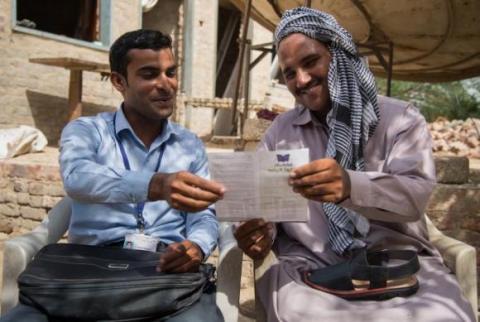
He was certain that his children would face the same fate of grinding poverty without access to education if he didn’t act and act fast.
Govind’s father worked very hard throughout his life, doing his best to meet the needs of the family. Despite working for 35 years in a shoe manufacturing shop, he could never save anything for himself or for his family. While relocating from the village, Govind’s family only had 70 rupees and his father’s shoemaking skills. Initially, a few of relatives supported them but they were also not financially strong enough. Govind decided to start his own business of making chappals and convinced his father to help him. His biggest roadblock was lack of funds.
In 2007, a field loan officer from Khushhali Microfinance Bank approached Govind, whose shoemaking business had yet to come into execution. A partner in the USAID, funded by U.S.-Pakistan Partnership for Access to Credit, Khushhali Microfinance Bank is a part of Pakistan's Poverty Reduction Strategy and its Microfinance Sector Development Program. Micro-financing is proven to successfully trigger upward social and economic mobility in the population stuck at the bottom of the economic pyramid by providing small-scale loans to businesses deemed unfit for commercial banking. Without access to credit, entrepreneurs like Govind are unable to make a profit.
Traditionally, commercial banks consider the small and medium size business sector as too risky an investment. The limitations in commercial banking renders leveraging formal financing routes improbable for micro and small entrepreneurs and perpetuates their dependence on informal and often exploitative informal mechanisms of lending and borrowing. Nearly three million of the 3.2 million businesses in Pakistan belong to this sector contributing, more than 30 per cent to Pakistan’s gross domestic product. Limited access to credit hinders this sector from growing the economy. Furthermore, about 80 per cent of Pakistan’s population does not have access to financial services at commercial banks. Microfinance is a targeted strategy to bring about a sustainable change in the lives of millions by providing opportunities to start and grow their own businesses.
Khushhalibank provided Govind, a first time borrower, an opportunity to obtain a loan of Rs10,000 to start his shoe-making venture. The new business owner was relieved to have found this breakthrough.
Govind is now a proud master of his skill. He recalls that in the past his earnings were only enough money to make it to the weekend. The loan allowed him to travel to Hyderabad and purchase enough material to make more than one pair of shoes. He invested in a machine, and hired two employees to increase his productivity. Soon, Govind made 10 pairs and was able to charge 100 rupees per shoe and eventually started saving money to reinvest in the business.
Govind’s first loan from Khushhalibank was for a mere 10,000 rupees but timely payments have enabled him to maintain a good customer relationship with the bank. As a result, his loan ceiling was increased and just recently the bank approved a loan of Rs125,000 for him. Due to Khushhalibank’s microfinance loan Govind’s business is doing fairly well, his children are going to school and he is dreaming to educate his children even if he was denied this right.
Govind is testament to what happens when hardworking Pakistanis are given an opportunity to lift themselves out of poverty. Given the right support, an individual and a family can transform its future. So whilst poverty in Pakistan remains a pressing social problem, Govind’s story shows us a potential solution.